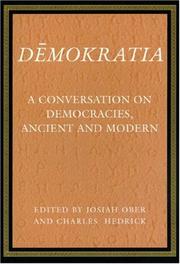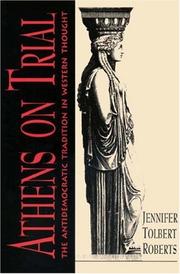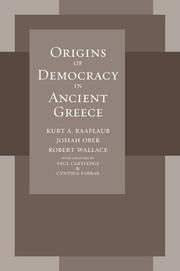| Listing 1 - 10 of 15 | << page >> |
Sort by
|

ISBN: 2877065561 9782877065566 Year: 2005 Publisher: Paris: Éd. de Fallois,
Abstract | Keywords | Export | Availability | Bookmark
 Loading...
Loading...Choose an application
- Reference Manager
- EndNote
- RefWorks (Direct export to RefWorks)
La démocratie a été inventée, analysée et louée par les Athéniens du Ve siècle avant J.-C. C'était une forme de démocratie particulière : une démocratie directe, dans laquelle chaque citoyen avait la possibilité de participer à toutes les décisions importantes, de façon souveraine. Or ce même Ve siècle est celui où l'on voit apparaître un surgissement sans pareil d'œuvres et de découvertes dans le domaine intellectuel et culturel. Le dernier livre de Jacqueline de Romilly entreprend d'établir un rapport étroit entre l'exercice nouveau de la démocratie et ce soudain épanouissement, qui en fut le prolongement. A la différence de ses livres précédents, Jacqueline de Romilly a largement orienté cet essai vers les problèmes d'aujourd'hui. L'expérience athénienne reste unique, mais la leçon qui se dégage de cette expérience ancienne permet de ranimer l'élan qui a donné d'aussi beaux résultats. Le passé peut ici inspirer l'avenir
Democracy --- History --- Classical Greek Political History --- Greece --- Athens (Greece) --- Democracy - Greece - History --- Democracy - Greece - Athens - History

ISBN: 0691011087 0691011095 9780691011080 9780691011097 0691227888 Year: 1996 Publisher: Princeton (N.J.): Princeton university press,
Abstract | Keywords | Export | Availability | Bookmark
 Loading...
Loading...Choose an application
- Reference Manager
- EndNote
- RefWorks (Direct export to RefWorks)
Democracy --- Democracy. --- History. --- --Democracy --- Self-government --- Political science --- Equality --- Representative government and representation --- Republics --- History --- Démocratie --- --Grèce ancienne --- --Politique --- Greece --- Athens (Greece) --- Democracy - Greece - Athens - History. --- Grèce ancienne --- Politique --- Democracy - Greece - Athens - History

ISBN: 0691056978 9780691056975 Year: 1994 Publisher: Princeton (N.J.): Princeton university press,
Abstract | Keywords | Export | Availability | Bookmark
 Loading...
Loading...Choose an application
- Reference Manager
- EndNote
- RefWorks (Direct export to RefWorks)
Democracy --- Greece --- Athens (Greece) --- History --- Political science --- Democracy - Greece - Athens - History. --- History. --- Democracy - History. --- Political science - History.
Book
ISBN: 9782081334724 2081334720 Year: 2020 Publisher: Paris: Flammarion,
Abstract | Keywords | Export | Availability | Bookmark
 Loading...
Loading...Choose an application
- Reference Manager
- EndNote
- RefWorks (Direct export to RefWorks)
"A la fin du Ve siècle avant notre ère, la guerre du Péloponnèse aboutit à la défaite d'Athènes. Profitant de la débâcle, une commission de trente Athéniens abolit les institutions démocratiques qui régissaient la vie politique de la cité depuis un siècle : c'est le début d'une guerre civile sanglante qui dure un peu plus d'un an. Car les démocrates ne restent pas sans réagir face aux oligarques : dès la fin de l'année 404, Thrasybule rassemble une armée de volontaires et, après plusieurs victoires retentissantes et des négociations difficiles, la réconciliation est conclue au début de l'automne 403, et la démocratie rétablie. À partir du destin de dix personnages singuliers, ce livre aborde l'événement, sous un angle inédit. S'inspirant du modèle du choeur antique, il entend proposer une description renouvelée de la société athénienne, à rebours des classifications figées dissociant citoyens, métèques et esclaves. Par sa brutalité, la guerre civile fait en effet émerger des collectifs multiples et mouvants, organisés autour de figures clés tels l'inclassable Socrate, l'oligarque Critias, le rhéteur LySias, mais aussi le scribe Nicomachos, l'ancien esclave Gèrys ou la prêtresse Lysimachè. En scrutant ces choeurs, l'enquête dévoile les hiérarchies et les tensions qui les traversent, mais surtout les pratiques et les émotions qui les soudent. Se dessine alors une nouvelle cartographie de la communauté athénienne, placée sous le signe de la pluralité et de la contingence. Cette histoire chorale s'interroge en définitive sur la façon de "faire société" : par quels processus une communauté en vient-elle à se déchirer, voire à se désintégrer, puis à se refonder? Une réflexion indispensable, qui fait écho à notre présent tourmenté."--Page 4 of cover
Democracy --- History --- Athens (Greece) --- Politics and government --- Greece --- Politics and government. --- Social life and customs. --- Democracy - Greece - Athens - History - To 1500 --- Athens (Greece) - History - Thirty Tyrants, 404-403 B.C --- Athens (Greece) - Politics and government

ISBN: 0521823730 0521530814 9780521823739 9780521530811 Year: 2005 Publisher: Cambridge: New York: Cambridge university press,
Abstract | Keywords | Export | Availability | Bookmark
 Loading...
Loading...Choose an application
- Reference Manager
- EndNote
- RefWorks (Direct export to RefWorks)
Delphian oracle --- Democracy --- Oracle de Delphes --- Démocratie --- Political aspects. --- Aspect politique --- Athens (Greece) --- Athènes (Grèce) --- Politics and government. --- Politique et gouvernement --- Political aspects --- History --- Politics and government --- Démocratie --- Athènes (Grèce) --- Delphic oracle --- Cults --- Oracles, Greek --- Delphian oracle - Political aspects --- Democracy - Greece - Athens - History - To 1500 --- Athens (Greece) - Politics and government

ISBN: 0520245628 9780520245624 Year: 2007 Publisher: Berkeley (Calif.): University of California press,
Abstract | Keywords | Export | Availability | Bookmark
 Loading...
Loading...Choose an application
- Reference Manager
- EndNote
- RefWorks (Direct export to RefWorks)
This book presents a state-of-the-art debate about the origins of Athenian democracy by five eminent scholars. The result is a stimulating, critical exploration and interpretation of the extant evidence on this intriguing and important topic. The authors address such questions as: Why was democracy first realized in ancient Greece? Was democracy "invented" or did it evolve over a long period of time? What were the conditions for democracy, the social and political foundations that made this development possible? And what factors turned the possibility of democracy into necessity and reality? The authors first examine the conditions in early Greek society that encouraged equality and "people's power." They then scrutinize, in their social and political contexts, three crucial points in the evolution of democracy: the reforms connected with the names of Solon, Cleisthenes, and Ephialtes in the early and late sixth and mid-fifth century. Finally, an ancient historian and a political scientist review the arguments presented in the previous chapters and add their own perspectives, asking what lessons we can draw today from the ancient democratic experience. Designed for a general readership as well as students and scholars, the book intends to provoke discussion by presenting side by side the evidence and arguments that support various explanations of the origins of democracy, thus enabling readers to join in the debate and draw their own conclusions.
Democracy --- History --- Greece --- Athens (Greece) --- Politics and government --- Politics and government. --- Démocratie --- Histoire --- Grèce --- Athènes (Grèce) --- Politique et gouvernement --- Self-government --- Political science --- Equality --- Representative government and representation --- Republics --- Democracy - Greece - History - To 1500 --- Democracy - Greece - Athens - History - To 1500 --- Greece - Politics and government - To 146 B.C. --- Athens (Greece) - Politics and government

ISBN: 0674197690 0674012585 9780674197695 Year: 1998 Publisher: Cambridge (Mass.): Harvard university press,
Abstract | Keywords | Export | Availability | Bookmark
 Loading...
Loading...Choose an application
- Reference Manager
- EndNote
- RefWorks (Direct export to RefWorks)
Democracy --- Arts, Greek --- Démocratie --- Arts grecs --- Political aspects --- Aspect politique --- Athens (Greece) --- Greece --- Athènes (Grèce) --- Grèce --- Civilization. --- History --- Politics and government --- Civilisation --- Histoire --- Politique et gouvernement --- Civilization --- Démocratie --- Athènes (Grèce) --- Grèce --- Athenian Supremacy, 479-431 B.C. --- Arts [Greek ] --- Democracy - Greece - Athens. --- Arts, Greek - Greece - Athens - Political aspects. --- History of ancient Greece --- Athens --- Democracy - Greece - Athens - History - To 1500 --- Arts, Greek - Political aspects - Greece - Athens --- Athens (Greece) - Civilization

ISBN: 3515078487 9783515078481 Year: 2001 Volume: 154. Publisher: Stuttgart: Steiner,
Abstract | Keywords | Export | Availability | Bookmark
 Loading...
Loading...Choose an application
- Reference Manager
- EndNote
- RefWorks (Direct export to RefWorks)
Democracy --- Political oratory --- Political science --- Démocratie --- Eloquence politique --- Science politique --- History --- Histoire --- Aristotle --- Athens (Greece) --- Athènes (Grèce) --- Politics and government. --- Politique et gouvernement --- Démocratie --- Athènes (Grèce) --- Aristotle. --- Contributions in philosophy of political science --- Greece --- Philosophy --- Democracy - Greece - Athens - History - To 1500. --- Political oratory - Greece - Athens - History - To 1500. --- Political science - Greece - Athens - History - To 1500. --- Attique (grece) --- Athenes (grece) --- Histoire politique --- 4e siecle av. j.-c.
Book
ISBN: 9782600007566 2600007563 Year: 2009 Volume: 56 Publisher: Genève: Fondation Hardt,
Abstract | Keywords | Export | Availability | Bookmark
 Loading...
Loading...Choose an application
- Reference Manager
- EndNote
- RefWorks (Direct export to RefWorks)
Democracy --- Démocratie --- Congresses. --- Congrès --- Athens (Greece) --- Athènes (Grèce) --- Politics and government --- Congresses --- Politique et gouvernement --- Culturele invloeden. --- Athene. --- Politics and government. --- Conferences - Meetings --- Democracy. --- Greece --- Démocratie --- Congrès --- Athènes (Grèce) --- Self-government --- Political science --- Equality --- Representative government and representation --- Republics --- History --- Aḟiny (Greece) --- Atene (Greece) --- Atʻēnkʻ (Greece) --- Ateny (Greece) --- Athen (Greece) --- Athēna (Greece) --- Athēnai (Greece) --- Athènes (Greece) --- Athinai (Greece) --- Athīnā (Greece) --- Αθήνα (Greece) --- Athene --- Democracy - Greece - Athens - Congresses --- Democracy - Greece - Athens - History - Congresses --- Democracy - Congresses --- Athens (Greece) - Politics and government - Congresses --- Grèce --- Antiquité
Book
ISBN: 9780292772045 0292772041 0292772033 9780292772038 9781477311349 1477311343 Year: 2015 Publisher: Austin University of Texas
Abstract | Keywords | Export | Availability | Bookmark
 Loading...
Loading...Choose an application
- Reference Manager
- EndNote
- RefWorks (Direct export to RefWorks)
In his On the Glory of Athens, Plutarch complained that the Athenian people spent more on the production of dramatic festivals and “the misfortunes of Medeas and Electras than they did on maintaining their empire and fighting for their liberty against the Persians.” This view of the Athenians’ misplaced priorities became orthodoxy with the publication of August Böckh’s 1817 book Die Staatshaushaltung der Athener [The Public Economy of Athens], which criticized the classical Athenian dēmo s for spending more on festivals than on wars and for levying unjust taxes to pay for their bloated government. But were the Athenians’ priorities really as misplaced as ancient and modern historians believed? Drawing on lines of evidence not available in Böckh’s time, Public Spending and Democracy in Classical Athens calculates the real costs of religion, politics, and war to settle the long-standing debate about what the ancient Athenians valued most highly. David M. Pritchard explains that, in Athenian democracy, voters had full control over public spending. When they voted for a bill, they always knew its cost and how much they normally spent on such bills. Therefore, the sums they chose to spend on festivals, politics, and the armed forces reflected the order of the priorities that they had set for their state. By calculating these sums, Pritchard convincingly demonstrates that it was not religion or politics but war that was the overriding priority of the Athenian people.
E-books --- Athens (Greece) -- Appropriations and expenditures -- History -- To 1500 --- Democracy -- Greece -- Athens -- History -- To 1500 --- Finance, Public -- Greece -- Athens -- History -- To 1500 --- War -- Economic aspects -- Greece -- Athens -- History -- To 1500 --- War and society -- Greece -- Athens -- History -- To 1500 --- Finance, Public --- Democracy --- War and society --- War --- Political Science --- Law, Politics & Government --- Public Finance --- Armed conflict (War) --- Conflict, Armed (War) --- Fighting --- Hostilities --- Wars --- International relations --- Military art and science --- Peace --- Society and war --- Sociology --- Civilians in war --- Sociology, Military --- Cameralistics --- Public finance --- Currency question --- History --- Economic aspects --- Social aspects --- Athens (Greece) --- Appropriations and expenditures --- Public finances
| Listing 1 - 10 of 15 | << page >> |
Sort by
|

 Search
Search Feedback
Feedback About UniCat
About UniCat  Help
Help News
News